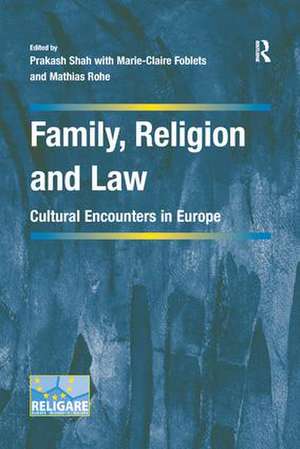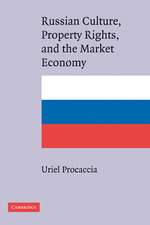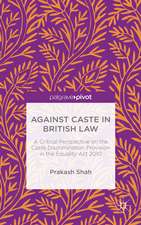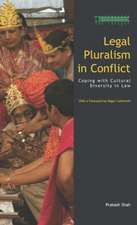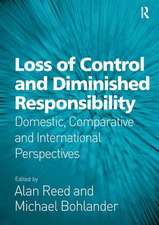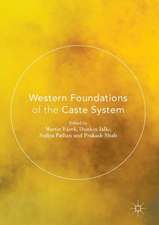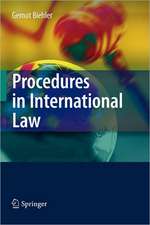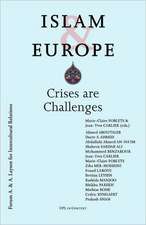Family, Religion and Law: Cultural Encounters in Europe: Cultural Diversity and Law in Association with RELIGARE
Editat de Prakash Shah, Marie-Claire Fobletsen Limba Engleză Paperback – 26 aug 2016
| Toate formatele și edițiile | Preț | Express |
|---|---|---|
| Paperback (1) | 467.94 lei 43-57 zile | |
| Taylor & Francis – 26 aug 2016 | 467.94 lei 43-57 zile | |
| Hardback (1) | 1003.43 lei 43-57 zile | |
| Taylor & Francis – 28 mai 2014 | 1003.43 lei 43-57 zile |
Preț: 467.94 lei
Nou
Puncte Express: 702
Preț estimativ în valută:
89.54€ • 93.74$ • 74.09£
89.54€ • 93.74$ • 74.09£
Carte tipărită la comandă
Livrare economică 07-21 aprilie
Preluare comenzi: 021 569.72.76
Specificații
ISBN-13: 9781138245600
ISBN-10: 1138245607
Pagini: 260
Dimensiuni: 156 x 234 x 14 mm
Greutate: 0.42 kg
Ediția:1
Editura: Taylor & Francis
Colecția Routledge
Seria Cultural Diversity and Law in Association with RELIGARE
Locul publicării:Oxford, United Kingdom
ISBN-10: 1138245607
Pagini: 260
Dimensiuni: 156 x 234 x 14 mm
Greutate: 0.42 kg
Ediția:1
Editura: Taylor & Francis
Colecția Routledge
Seria Cultural Diversity and Law in Association with RELIGARE
Locul publicării:Oxford, United Kingdom
Notă biografică
Dr Prakash Shah is Reader in Culture and Law, and Director of GLOCUL: The Centre for Culture and Law at Queen Mary University of London. He specializes in legal pluralism, religion and law, ethnic minorities and diasporas in law, immigration, refugee and nationality law, and comparative law with special reference to South Asia. He has published widely and lectured internationally in these fields. Professor Marie-Claire Foblets is Director of the Department of Law & Anthropology at the Max Planck Institute for Social Anthropology, Germany. For many years she headed the Institute for Migration Law and Legal Anthropology at the Law Faculty at the Catholic University of Leuven, Belgium. She currently leads the RELIGARE research project financed by the European Commission under its 7th Framework Programme. Prof.Dr. Mathias Rohe is Chair for Civil Law, Private International Law and Comparative Law at the University Erlangen-Nürnberg, Germany. He is also Director of the Erlangen Centre for Islam and law in Europe, a judge at the court of appeals Nürnberg (retired), member of the German Islam Conferences (Ministry of the Interior) and the Austrian Islam Dialogue Forum (State secretary). He is the author of numerous publications and lectures on Islamic law in the past and present, Private International law, Comparative law and legal issues related to Muslims in Europe.
Recenzii
’In twenty-first century Europe, the recognition and fair treatment of diversity in law is central to realising justice yet remains a daunting challenge for legal systems. This impressive collection does not claim to offer a comprehensive solution but persuasively shows how the best approaches combine knowledge, openness and sensitivity with a firm grasp of principle.’ Helena Wray, Middlesex University, UK ’Each chapter of this book is an intelligent and sensitive reminder of the principle according to which justice is not equality but treating differently what is different.’ Carlos Gómez MartÃnez, President of the Court of Appeal of the Balearic Islands and Former Director of the Spanish Judicial School ’ ...offers a most timely, rich and much needed body of comparative work which presents discerning insights into the challenges of legal pluralism and the ways in which cultural and religious minorities in a range of European contexts navigate the legal system. This book fills a critical gap in current research, offering lawyers, academics, judges, parliamentarians and many others, unique and critical insights into the key questions they ought to be asking.’ Puja Kapai, University of Hong Kong ’The book’s combination of theoretical chapters and case studies, Europe-wide analysis and jurisdiction (or religion) specific studies makes it a useful resource. Those wishing to get an overview of the current state of the interaction of family, religion and law across Europe will find value in the breadth of topics covered by the book. Those seeking to explore any of the topics covered by specific chapters would also find much to admire in the book.’ Journal of Legal Pluralism and Unofficial Law
Cuprins
Preface: Family, Religion and Law in Europe: Embracing Diversity from the Perspective of ‘Cultural Encounters’, Marie-Claire Foblets; Chapter 1 Distorting Minority Laws? Religious Diversity and European Legal Systems, Prakash Shah; Chapter 2 Plurality-Conscious Rebalancing of Family Law Regulation in Europe, Werner Menski; Chapter 3 Family and the Law in Europe: Bringing Together Secular Legal Orders and Religious Norms and Needs, Mathias Rohe; Chapter 4 On the Cooperation between Religious and State Institutions in Family Matters: Nordic Experiences, Maarit Jänterä-Jareborg; Chapter 5 The Uniformisation of Family Law in Europe and the Place of Ethnic Minorities, Domenico Francavilla; Chapter 6 Defending the Family Treasure Chest: Navigating Muslim Families and Secured Positivistic Islands of European Legal Systems, Federica Sona; Chapter 7 Cross-border Family Cases and Religious Diversity: What Can Judges Do?, Maarit Jänterä-Jareborg; Chapter 8 Secrets and Lies: When Ethnic Minority Youth Have a Nikah, Anika Liversage; Chapter 9 ‘Without Our Church We Will Disappear’: Syrian Orthodox Christians in Diaspora and the Family Law of the Church, Annika Rabo; Chapter 10 Religious Divorce in England and Wales: Religious Tribunals in Action, Gillian Douglas, Russell Sandberg, Norman Doe, Sophie Gilliat-Ray, Asma Khan; Chapter 11 Kurdish ‘Unofficial’ Family Law in the Gurbet, Latif Ta?;
Descriere
This collection discusses how official legal systems respond to the reality of a plurality of family types and origins within their jurisdictions. Presenting empirical research which includes legal and sociological data of unprecedented comparative depth, the volume addresses issues such as how minority families respond to the need to organise their legal relationships and resolve their disputes in the shadow of official legal systems which differ from those of their familial and communal traditions. The book invites reflection and demonstrates the urgency and complexity of the questions regarding the search for justice in the field of family life in Europe today.
